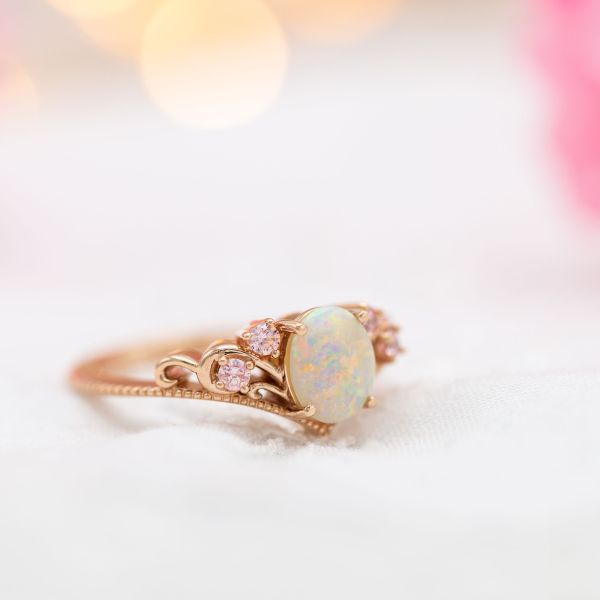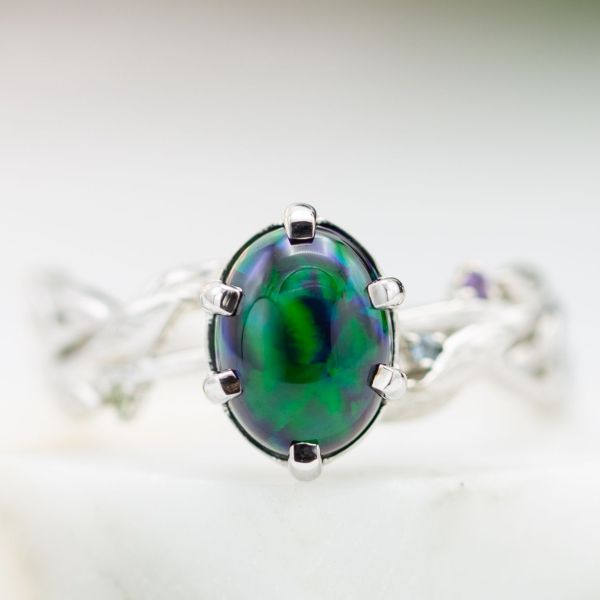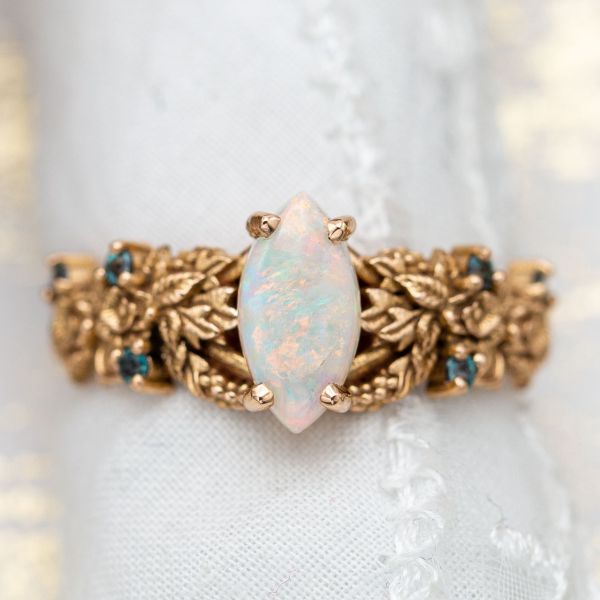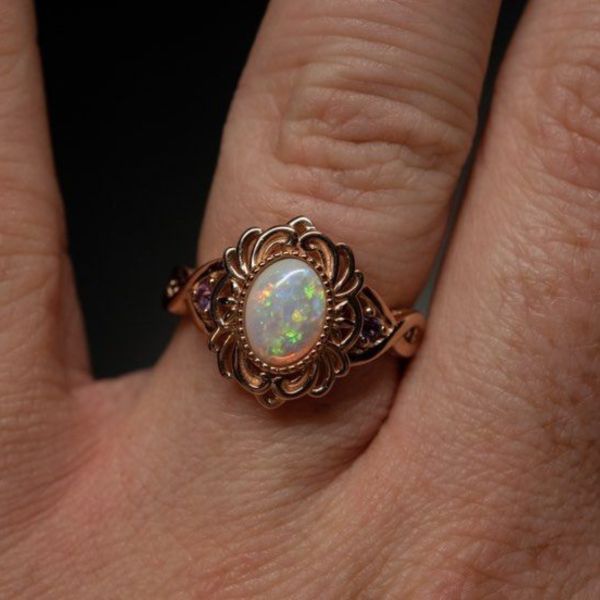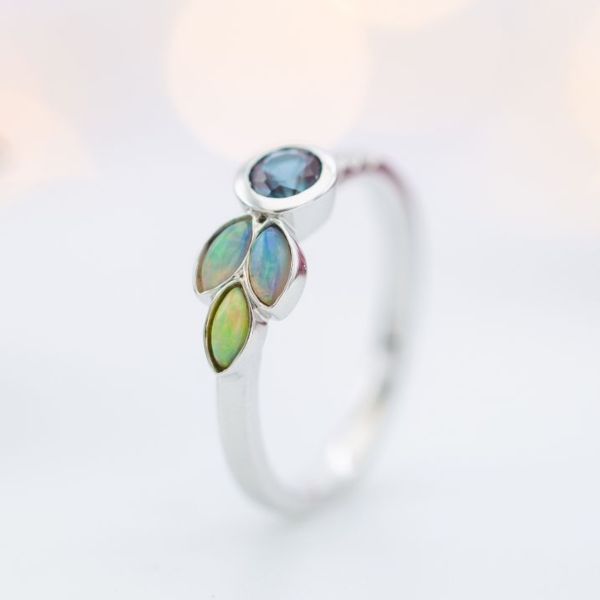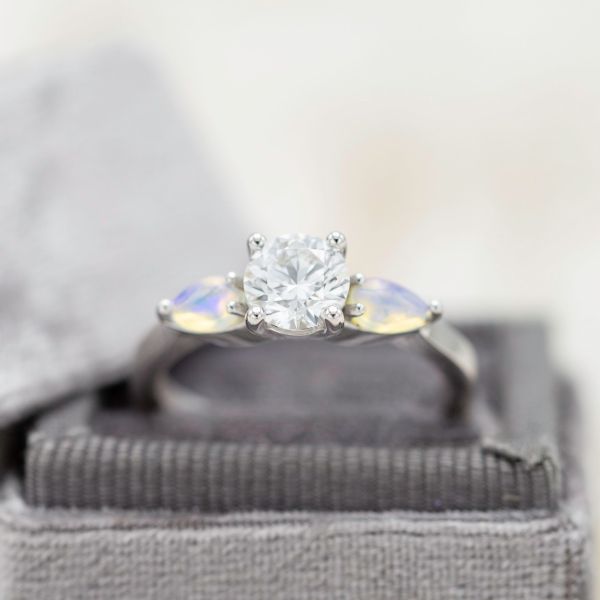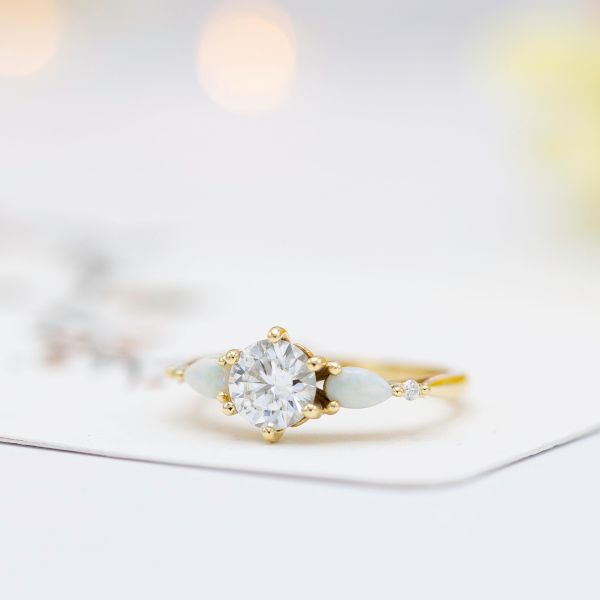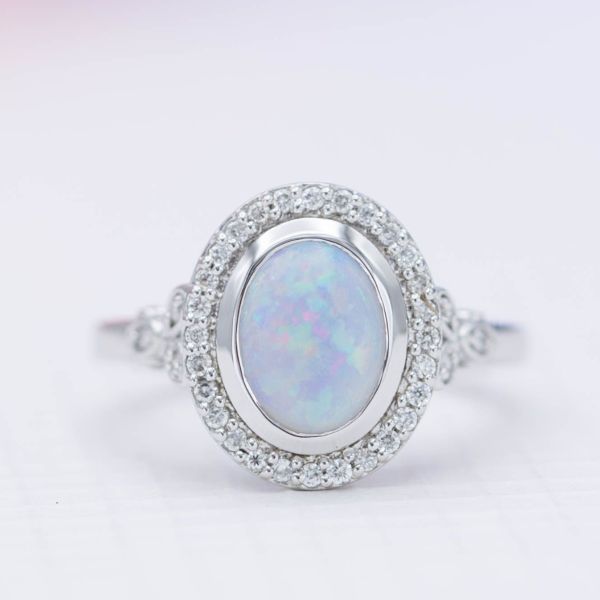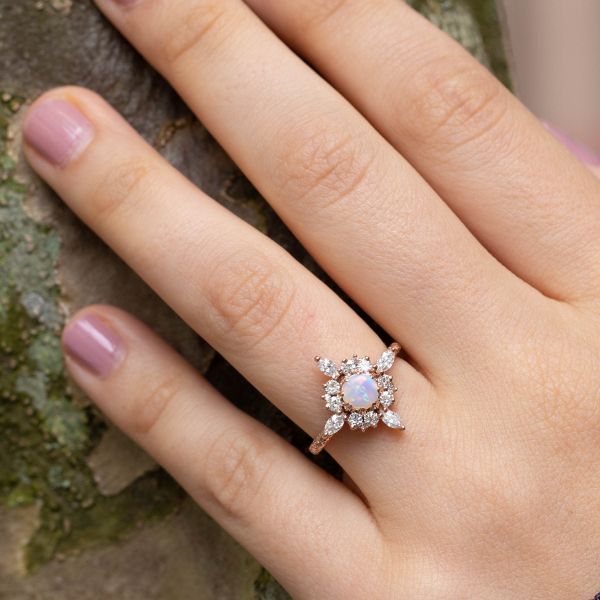Gemstone Knowledge
Is opal a good choice for an engagement ring?
Opals feature a dazzling mix of colors, but are they durable enough for an engagement ring?
Is opal the right choice for your center stone?
Let’s get right to it. Are opals durable? They’re definitely much more fragile than alternatives like diamonds and sapphires. While precious opals are a great choice for fine jewelry, setting one in a daily-wear ring puts it at higher risk. But there’s really no substitute for the unique beauty of an opal. No other gem has the same stunning play of color that so many people love. So if you love the look of opal, and you're aware of the durability considerations, we absolutely think it’s a great choice for an engagement ring!
Now that you know where we stand, let's look at the pros and cons in a bit more detail.
Risks to consider
Opals are a bit delicate
We look at three factors when considering the durability of a gem: hardness (how easy is it to scratch the gem?), toughness (how easy is it to crack or chip the gem?), and stability (will chemicals, light, temperature, or moisture alter the gem’s appearance?). Opal is relatively fragile on all three of these.
Hardness
Opals are in the range 5.5 - 6.5 on the Mohs hardness scale. That’s a relatively soft gem, meaning there are a number of substances that can scratch it. For example, small particles of quartz are common in household dust, and quartz is a 7 on the Mohs scale. Since materials with a higher number can scratch those with a lower number, those quartz particles could scratch the surface of your opal (e.g. if you have dust on a cleaning cloth and use it to wipe the surface of the opal).
You can see how how opal compares to a few other popular center stones (or click through to see our full gem hardness chart):
Toughness
Opal are relatively tough, but a hard knock on a table top could crack or chip your opal. But that’s true even of a diamond, so on this factor, opal stands up relatively well.
Stability
Opals will typically contain a certain amount of moisture in the gem and loss of that moisture can cause the opal to develop a network of cracks across its surface. This is referred to as crazing. That moisture loss can be caused by storing the gem in very dry or hot conditions, or leaving it in direct sunlight for long periods of time. Extreme changes in temperature can also harm the opal. Additionally, hydrophane opals (like many of those that come from Ethiopia) will readily absorb water and can also absorb oils or chemicals that travel into the stone with the water, which can lead to discoloration or loss of the stone’s beautiful color play.
With all of these considerations in mind, we classify opals as a higher risk gem for daily wear. These delicate center stones will require some extra care (and may require occasional replacement) but they can still make a great engagement ring center stone.
Reasons to choose an opal
Opals are beautiful, beloved, and have no substitute
Opals are gorgeous, unique, personal, and hugely popular. In fact, they are one of our top five most popular engagement ring stones. No other gem features the same shimmering rainbow of colors that you'll find in opal.
Opals are truly one of a kind. Many customers know them well and have their hearts set on one of the well known varieties of opal. And there’s really no substitute. Opals display bright flashes of color that change at every angle, with a broad range (and unique mix) of colors represented, and distinctive patterns that range from small pinpoints of color to large rolling flashes. There’s no alternative we can recommend that gives you a comparable look with better durability. For many, that’s absolutely worth the risk.
Opals are relatively inexpensive
When compared to popular center stone alternatives, opals are among the most affordable. Most of our white opals sell for $150-400. So if your center stone might require replacement from time to time, it can be reassuring that the cost is not prohibitive. We know this doesn’t work for everyone. An engagement ring has so much meaning associated with it that, for some, the idea of losing and replacing a center stone feels like a major loss, regardless of the cost. Trust your gut: if the idea of replacing your center stone makes your heart sink, you may want to consider another center stone gem.
Many people wear opals for years
We should point out that people have been making and wearing opal rings for a very long time. We often hear anecdotes of opal rings being worn regularly for decades without any issue. So, while there’s risk, there are plenty of happy opal wearers who assure us that they’re happy with their choice!
Alternatives
As we noted above, there really are no alternatives that provide the same look and greater durability. Some opal lovers are also drawn to the unique shimmer of moonstone, which is a beautiful and unique gemstone in its own right, but falls into the same delicate category as opal from a durability perspective. If you love opal but feel uncomfortable choosing it as your center stone, consider the alternative of setting opal accent gems in your design. You may find the idea of replacing an accent opal as part of routine maintenance on the ring to be perfectly reasonable.
Caring for your opal
Activities and precautions
Opals are relatively soft gemstones that contain up to 21% water. To keep them looking new, you'll want to avoid scratches and big fluctuations in moisture content. Avoiding scratches means taking your opal ring off for sports, exercise, dish washing, and other activities where it's likely to be banged. Maintaining moisture means steering clear of chemicals and large fluctuations in temperature. Take off your ring before going in pools and avoid leaving it for long periods in direct sunlight or sitting next to sources of cold or heat like fireplaces.
Setting styles
Certain design choices can help protect your opal. For example, bezel settings are popular, as they're considered the safest way to secure opals without putting them under stress.
How to clean opals
Opal jewelry can be cleaned just like most other gemstones. We recommend cleaning with warm water, mild dish soap, and a soft cloth. A simple approach is best.
Cleaning mistakes to avoid
Avoid cleaning with firmer brushes or toothbrushes. These may be safe for diamonds or other gems, but not for opals. Avoid industrial cleaners and diamond jewelry cleaners. Don't use ultrasonic or steam cleaners. Unless you're having lots of trouble cleaning your jewelry, don't soak in water. We recommend this approach for other gems, but in opals it can lead to water content that is too high, temporarily changing the stone's appearance. If your opal has been immersed in water, let it dry naturally at room temperature and it will return to normal in hours or days, depending on how long it was immersed. Never use a hairdryer or high temperatures to dry opal jewelry. This will dry out the stone and can lead to cracking and crazing.
Conclusion
So, are opals a good choice for an engagement ring? They sure are! It’s such a personal and emotional choice (but, when it comes to designing an engagement ring, aren’t they all?), and we feel strongly that you should make a fully informed decision. If you’ve read the considerations above and know that opal is right for you, we think you’ve made a great choice and we’ll be thrilled to help you design the perfect opal ring. You’ll join the many happy couples who have popped the question (or #justsaidyes) with a show stopping opal ring!
About CustomMade
CustomMade designs and creates one-of-a-kind, custom engagement rings and fine jewelry. Each piece we create is inspired by you, designed for you, and made just for you.
